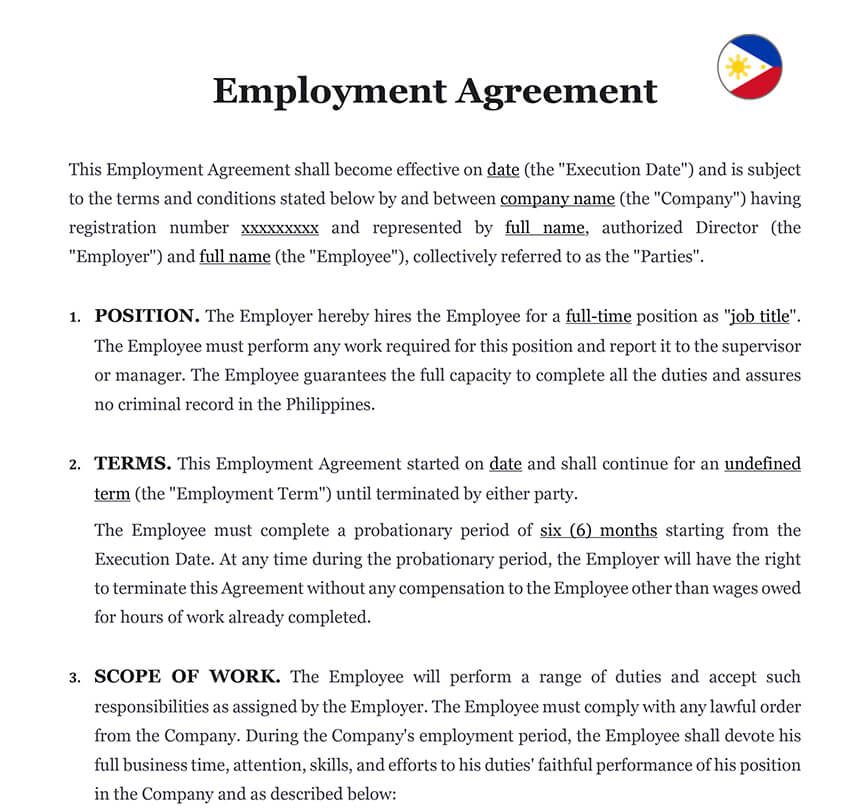What does hiring local employees in the Philippines entail?
Hiring local employees in the Philippines involves several key steps and considerations. Firstly, employers need to understand the local labor market and the specific skills and qualifications required for the job positions they are looking to fill. It is important to comply with labor laws and regulations, including minimum wage requirements, working hours, and employee benefits. Employers must also establish a fair and transparent recruitment process, which may include advertising job vacancies, conducting interviews, and assessing candidates based on their qualifications and suitability for the role. Once a candidate is selected, employers need to prepare an employment contract that outlines the terms and conditions of employment, including salary, benefits, and probationary periods. Employers are also responsible for ensuring a safe and healthy work environment and complying with occupational safety and health regulations. Additionally, employers must register employees with the appropriate government agencies, such as the Social Security System (SSS) and the Philippine Health Insurance Corporation (PhilHealth), and withhold the necessary taxes from their salaries.
What are the key considerations when hiring foreign employees in the Philippines?
When hiring foreign employees in the Philippines, there are several important considerations to keep in mind. Firstly, employers must ensure that the foreign employee possesses the necessary work permit or visa to legally work in the country. The process for obtaining work permits and visas can vary depending on the nature of the employment, the duration of the stay, and the nationality of the foreign employee. Employers should be familiar with the different types of work permits and visas available and understand the specific requirements and documentation needed for each. It is also important to comply with immigration laws and regulations, such as the Alien Employment Permit (AEP) requirement for certain foreign workers. Employers must provide proper onboarding and orientation for foreign employees to help them acclimate to the local work culture and environment. Additionally, employers should consider any language or cultural barriers that may affect communication and integration in the workplace. It is also essential to ensure that foreign employees are treated fairly and provided with the same rights and protections as local employees under Philippine labor laws.
What are the legal requirements for hiring employees in the Philippines?
When hiring employees in the Philippines, employers must adhere to various legal requirements to ensure compliance with labor laws and regulations. Some key legal requirements include:
1. Employment Contracts: Employers are required to provide written employment contracts to their employees, which outline the terms and conditions of employment, including compensation, benefits, working hours, and employment status. The contract should also include provisions on probationary periods, termination procedures, and dispute resolution mechanisms.
2. Minimum Wage: Employers must comply with the minimum wage rates set by the government, which may vary depending on the geographic location and industry. The minimum wage is periodically reviewed and adjusted to reflect changes in the cost of living.
3. Working Hours and Overtime: Employers must ensure that employees work within the prescribed maximum working hours per day and per week. Any work performed beyond the regular working hours is considered overtime and must be compensated accordingly.
4. Employee Benefits: Employers are required to provide mandatory employee benefits such as social security contributions, health insurance coverage, and other statutory benefits specified under the law.
5. Occupational Safety and Health: Employers must provide a safe and healthy work environment and comply with occupational safety and health standards and regulations. This includes conducting regular safety inspections, providing necessary safety equipment and training, and addressing workplace hazards.
6. Termination and Severance: Employers must follow legal procedures and requirements when terminating employees, including providing written notice and observing due process. In certain cases, employers may be required to provide severance pay or separation benefits.
It is essential for employers to familiarize themselves with the labor laws and regulations in the Philippines to ensure compliance and protect the rights of their employees.
Employers and employees should carefully review and understand the terms of the employment contract to ensure compliance with legal requirements and to protect their respective rights and interests.
How can employers effectively recruit local talent in the Philippines?
To effectively recruit local talent in the Philippines, employers can consider various strategies. Firstly, they can advertise job vacancies through online job portals, social media platforms, and industry-specific websites with clear and compelling job descriptions. Networking and referrals can also be valuable, leveraging professional networks and offering incentives for successful referrals. Engaging with universities and colleges through career fairs and campus recruitment events allows access to a pool of fresh graduates. Building relationships with professional associations and attending industry events facilitates networking and candidate exploration. Developing employee development programs such as internships or trainee programs helps identify potential talent. Establishing a strong employer brand, showcasing company culture and growth opportunities, can attract top talent. Partnering with reputable recruitment agencies specializing in the desired industry or job positions can streamline the process. By implementing these strategies, employers can enhance their chances of finding and attracting the right talent for their organization.
What are the work permit and visa requirements for hiring foreign employees in the Philippines?
Employers in the Philippines must navigate work permit and visa requirements when hiring foreign employees. The Alien Employment Permit (AEP) is typically needed, along with appropriate work visas such as the 9(g) Pre-Arranged Employee Visa or Special Work Permit (SWP). Bureau of Immigration (BI) Clearance may also be necessary. Compliance is essential to avoid legal complications for both employers and employees.
What are the clauses to include in employment contracts when hiring employees in the Philippines?
When drafting employment contracts for hiring employees in the Philippines, there are several important clauses to include:
1. Job Description and Duties
Clearly define the employee’s role, responsibilities, and duties within the organization. This helps establish expectations and sets the foundation for performance evaluations and evaluations.
2. Compensation and Benefits
Specify the employee’s salary, payment frequency, and any additional benefits or allowances they are entitled to. This may include health insurance, vacation and sick leave, retirement plans, and other statutory benefits.
3. Workinghours
Depending on the circumstances of termination, employees may be entitled to receive severance pay, separation pay, or other benefits as provided by law or their employment contract. These payments are intended to assist employees during their transition period after job loss.
4. Probationary Period
If applicable, include the duration and terms of the probationary period. This period allows both the employer and employee to assess suitability and performance before confirming long-term employment.
5. Termination Procedures
Specify the procedures and grounds for termination, including notice periods, severance pay, and any conditions for termination such as breach of contract or misconduct. You can use the Employment Termination Letter to terminate your employee.
6. Confidentiality and Non-Disclosure
Include clauses that protect the company’s confidential information and trade secrets through NDAs. This ensures that employees understand their obligations to maintain confidentiality.
7. Intellectual Property
Clearly state the ownership of any intellectual property created by the employee during the course of their employment. This helps safeguard the company’s rights to intellectual property developed by its employees.
8. Non-Competition
If applicable, include non-competition clauses that restrict employees from engaging in similar activities or working for competitors during and after their employment with the company. You can use an Employee Non-Compete Agreement to safeguard your interests.
9. Dispute Resolution
Specify the mechanisms for resolving disputes, such as arbitration or mediation, to avoid lengthy and costly legal proceedings.
10. Governing Law
Including these clauses in employment contracts helps establish clear expectations, rights, and obligations for both the employer and the employee. It is advisable to consult with legal professionals to ensure that employment contracts comply with local labor laws and regulations.
Indicate the applicable laws and jurisdiction governing the employment contract. This ensures clarity and consistency in interpreting and enforcing the contract.
What are the tax obligations for employers hiring both local and foreign employees in the Philippines?
Employers hiring both local and foreign employees in the Philippines have specific tax obligations to fulfill. Key considerations include withholding tax, social security and health insurance contributions, employee benefits and fringe benefits tax, and the annual income tax return. Employers are responsible for deducting and remitting the correct amount of withholding tax based on employees’ income brackets. They must contribute to the social security and health insurance funds on behalf of their employees, and should be aware of the tax implications of providing employee benefits and fringe benefits. Employers must provide employees with the necessary tax documents and submit an annual information return summarizing employee compensation and taxes withheld. Staying updated with tax regulations is crucial to ensure compliance and avoid penalties. Seeking guidance from tax professionals or consulting the Bureau of Internal Revenue (BIR) can help employers navigate their tax obligations effectively.











